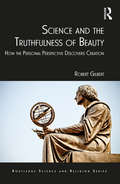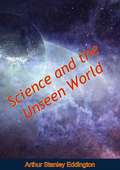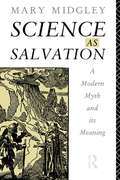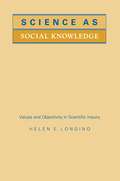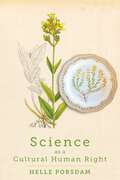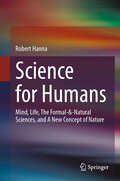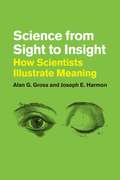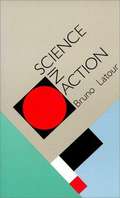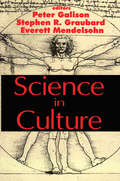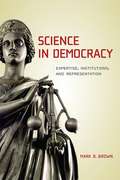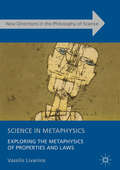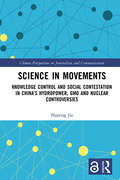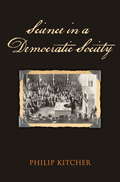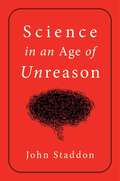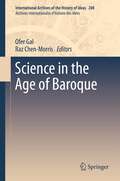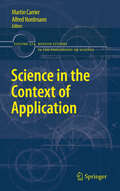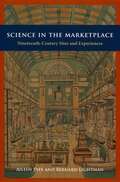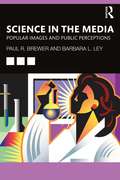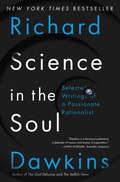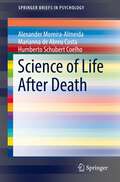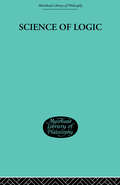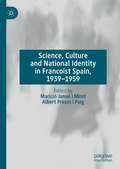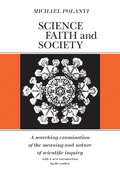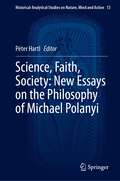- Table View
- List View
Science and the Truthfulness of Beauty: How the Personal Perspective Discovers Creation (Routledge Science and Religion Series)
by Robert GilbertWhen scientists describe their results or insights as 'beautiful', are they using the term differently from when they use it of a landscape, music or another person? Science and the Truthfulness of Beauty re-examines the way in which seeing beauty in the world plays the key role in scientific advances, and argues that the reliance on such a personal point of view is ultimately justified by belief that we are made in the 'image of God', as Christian and Jewish believers assert. It brings a fresh voice to the ongoing debate about faith and science, and suggests that scientists have as much explaining to do as believers when it comes to the ways they reach their conclusions.
Science and the Unseen World
by Arthur Stanley EddingtonPhysicist and astronomer Arthur Eddington tested Einstein's Theory of Relativity at an eclipse in 1919. A lifelong Quaker, his 1929 Swarthmore Lecture explores how science and religion define and look at reality. ‘You will understand the true spirit neither of science nor of religion unless seeking is placed in the forefront.’ ‘He puts a strong line against simplistic reductionism in relation to our minds . He emphasizes that when we ask the question, “What are we to think of it all? What is it all about?,” the answer must embrace but not be limited to the scientific answer. His lecture explores this in a delightful way, that remains fully relevant today.’ — Prof. George Ellis 'The attitude of the scientist, here so admirably explained, is the attitude, also, of the mystic. Experience, to both, is what matters most.”’- The Sufi Quarterly, 1929.
Science as Salvation: A Modern Myth and its Meaning
by Mary MidgleyWhat is the role of scientists in society? What should we think when they talk about more than just science? Mary Midgley discusses the high spiritual ambitions which tend to gather around the notion of science.
Science as Social Knowledge: Values and Objectivity in Scientific Inquiry
by Helen E. LonginoConventional wisdom has it that the sciences, properly pursued, constitute a pure, value-free method of obtaining knowledge about the natural world. In light of the social and normative dimensions of many scientific debates, Helen Longino finds that general accounts of scientific methodology cannot support this common belief. Focusing on the notion of evidence, the author argues that a methodology powerful enough to account for theories of any scope and depth is incapable of ruling out the influence of social and cultural values in the very structuring of knowledge. The objectivity of scientific inquiry can nevertheless be maintained, she proposes, by understanding scientific inquiry as a social rather than an individual process. Seeking to open a dialogue between methodologists and social critics of the sciences, Longino develops this concept of "contextual empiricism" in an analysis of research programs that have drawn criticism from feminists. Examining theories of human evolution and of prenatal hormonal determination of "gender-role" behavior, of sex differences in cognition, and of sexual orientation, the author shows how assumptions laden with social values affect the description, presentation, and interpretation of data. In particular, Longino argues that research on the hormonal basis of "sex-differentiated behavior" involves assumptions not only about gender relations but also about human action and agency. She concludes with a discussion of the relation between science, values, and ideology, based on the work of Habermas, Foucault, Keller, and Haraway.
Science as a Cultural Human Right (Pennsylvania Studies in Human Rights)
by Helle PorsdamThe human right to science, outlined in the 1948 Universal Declaration of Human Rights and repeated in the 1966 International Covenant on Economic, Social, and Cultural Rights, recognizes everyone’s right to “share in scientific advancement and its benefits” and to “enjoy the benefits of scientific progress and its applications.” This right also requires state parties to develop and disseminate science, to respect the freedom of scientific research, and to recognize the benefits of international contacts and co-operation in the scientific field.The right to science has never been more important. Even before the COVID-19 health crisis, it was evident that people around the world increasingly rely on science and technology in almost every sphere of their lives from the development of medicines and the treatment of diseases, to transport, agriculture, and the facilitation of global communication. At the same time, however, the value of science has been under attack, with some raising alarm at the emergence of “post-truth” societies. “Dual use” and unintended, because often unforeseen, consequences of emerging technologies are also perceived to be a serious risk.The important role played by science and technology and the potential for dual use makes it imperative to evaluate scientific research and its products not only on their scientific but also on their human rights merits. In Science as a Cultural Human Right, Helle Porsdam argues robustly for the role of the right to science now and in the future. The book analyzes the legal stature of this right, the potential consequences of not establishing it as fundamental, and its connection to global cultural rights. It offers the basis for defending the free and responsible practice of science and ensuring that its benefits are spread globally.
Science between Europe and Asia
by Feza Günergun Dhruv RainaThis book explores the various historical and cultural aspects of scientific, medical and technical exchanges that occurred between central Europe and Asia. A number of papers investigate the printing, gunpowder, guncasting, shipbuilding, metallurgical and drilling technologies while others deal with mapping techniques, the adoption of written calculation and mechanical clocks as well as the use of medical techniques such as pulse taking and electrotherapy. While human mobility played a significant role in the exchange of knowledge, translating European books into local languages helped the introduction of new knowledge in mathematical, physical and natural sciences from central Europe to its periphery and to the Middle East and Asian cultures. The book argues that the process of transmission of knowledge whether theoretical or practical was not a simple and one-way process from the donor to the receiver as it is often admitted, but a multi-dimensional and complex cultural process of selection and transformation where ancient scientific and local traditions and elements. The book explores the issue from a different geopolitical perspective, namely not focusing on a singular recipient and several points of distribution, namely the metropolitan centres of science, medicine, and technology, but on regions that are both recipients and distributors and provides new perspectives based on newly investigated material for historical studies on the cross scientific exchanges between different parts of the world.
Science for Humans: Mind, Life, The Formal-&-Natural Sciences, and A New Concept of Nature
by Robert HannaThis book presents and defends an original and paradigm-shifting conception of formal science, natural science, and the natural universe alike, that’s fully pro-science, but at the same time neither theological or God-centered, nor solipsistic or self-centered, nor communitarian or social-institution-centered, nor scientistic or science-valorizing, nor materialist/physicalist or reductive, nor—above all—mechanistic. It does this by presenting and defending what Robert Hanna calls the neo-organicist turn, including manifest realism and the three sub-parts of metaphysical organicism: liberal naturalism, mind-life continuity, and explanatory inversion, whereby mechanical systems are explained by grounding them in organic systems, and not the other way around. Or more briefly and simply put, the purpose of this book is to present and defend science for humans. As such, it will be highly interesting and profoundly relevant to graduate students and specialist researchers in philosophy and the formal-&-natural sciences.
Science from Sight to Insight: How Scientists Illustrate Meaning
by Alan G. Gross Joseph E. HarmonJohn Dalton’s molecular structures. Scatter plots and geometric diagrams. Watson and Crick’s double helix. The way in which scientists understand the world—and the key concepts that explain it—is undeniably bound up in not only words, but images. Moreover, from PowerPoint presentations to articles in academic journals, scientific communication routinely relies on the relationship between words and pictures. In Science from Sight to Insight, Alan G. Gross and Joseph E. Harmon present a short history of the scientific visual, and then formulate a theory about the interaction between the visual and textual. With great insight and admirable rigor, the authors argue that scientific meaning itself comes from the complex interplay between the verbal and the visual in the form of graphs, diagrams, maps, drawings, and photographs. The authors use a variety of tools to probe the nature of scientific images, from Heidegger’s philosophy of science to Peirce’s semiotics of visual communication. Their synthesis of these elements offers readers an examination of scientific visuals at a much deeper and more meaningful level than ever before.
Science in Action: How to Follow Scientists and Engineers Through Society
by Bruno LatourScience and technology have immense authority and influence in our society, yet their working remains little understood. The conventional perception of science in Western societies has been modified in recent years by the work of philosophers, sociologists and historians of science. In this book Bruno Latour brings together these different approaches to provide a lively and challenging analysis of science, demonstrating how social context and technical content are both essential to a proper understanding of scientific activity. Emphasizing that science can only be understood through its practice, the author examines science and technology in action: the role of scientific literature, the activities of laboratories, the institutional context of science in the modern world, and the means by which inventions and discoveries become accepted. From the study of scientific practice he develops an analysis of science as the building of networks. Throughout, Bruno Latour shows how a lively and realistic picture of science in action alters our conception of not only the natural sciences but also the social sciences and the sociology of knowledge in general. This stimulating book, drawing on a wealth of examples from a wide range of scientific activities, will interest all philosophers, sociologists and historians of science, scientists and engineers, and students of the philosophy of social science and the sociology of knowledge.
Science in Culture: His Legacy In Science, Art, And Modern Culture
by Peter Galison Stephen R. Graubard Everett MendelsohnTwenty-five years ago, Gerald Holton's Thematic Origins of Scientific Thought introduced a wide audience to his ideas. Holton argued that from ancient times to the modern period, an astonishing feature of innovative scientific work was its ability to hold, simultaneously, deep and opposite commitments of the most fundamental sort. Over the course of Holton's career, he embraced both the humanities and the sciences. Given this background, it is fitting that the explorations assembled in this volume reflect both individually and collectively Holton's dual roots. In the opening essay, Holton sums up his long engagement with Einstein and his thematic commitment to unity. The next two essays address this concern. In historicized form, Lorraine Daston returns the question of the scientific imagination to the Enlightenment period when both sciences and art feared imagination. Daston argues that the split whereby imagination was valued in the arts and loathed in the sciences is a nineteenth-century divide. James Ackerman on Leonardo da Vinci meshes perfectly with Daston's account, showing a form of imaginative intervention where it is irrelevant to draw analogies between art and science. Historians of religion Wendy Doniger and Gregory Spinner pursue the imagination into the bedroom with literary-theological representations. Science, culture, and the imagination also intersect with biologist Edward Wilson and physicist Steven Weinberg. Both tackle the big question of the unity of knowledge and worldviews from a scientific perspective while art historian Ernst Gombrich does the same from the perspective of art history. To emphasize the nitty-gritty of scientific practice, chemists Bretislav Fredrich and Dudley Herschback provide a remarkable historical tour at the boundary of chemistry and physics. In the concluding essay, historian of education Patricia Albjerg Graham addresses pedagogy head-on. In these various reflections on science, art, literature, philosophy, and education, this volume gives us a view in common: a deep and abiding respect for Gerald Holton's contribution to our understanding of science in culture. Peter Galison is Mallinckrodt Professor of History of Science and of physics at Harvard University. Stephen R. Graubard is editor of the American Academy of Arts and Sciences and its journal, Daedalus, and professor of history emeritus at Brown University. Everett Mendelsohn is director of the History of Science Program at Harvard University.
Science in Democracy: Expertise, Institutions, and Representations
by Mark B. BrownPublic controversies over issues ranging from global warming to biotechnology have politicized scientific expertise and research. Some respond with calls for restoring a golden age of value-free science. More promising efforts seek to democratize science. But what does that mean? Can it go beyond the typical focus on public participation? How does the politics of science challenge prevailing views of democracy? In Science in Democracy, Mark Brown draws on science and technology studies, democratic theory, and the history of political thought to show why an adequate response to politicized science depends on rethinking both science and democracy.<P> Brown enlists such canonical and contemporary thinkers as Machiavelli, Hobbes, Rousseau, Dewey, and Latour to argue that the familiar dichotomy between politics and science reinforces a similar dichotomy between direct democracy and representative government. He then develops an alternative perspective based on the mutual shaping of participation and representation in both science and politics. Political representation requires scientific expertise, and scientific institutions may become sites of political representation. Brown illustrates his argument with examples from expert advisory committees, bioethics councils, and lay forums. Different institutional venues, he shows, mediate different elements of democratic representation. If we understand democracy as an institutionally distributed process of collective representation, Brown argues, it becomes easier to see the politicization of science not as a threat to democracy but as an opportunity for it.
Science in Metaphysics
by Vassilis LivaniosThis book explores the dispositional and categorical debates on the metaphysics of properties. It defends the view that all fundamental properties and relations are contingently categorical, while also examining alternative accounts of the nature of properties. Drawing upon both established research and the author's own investigation into the broader discipline of the metaphysics of science, this book provides a comprehensive study of the many views and opinions regarding a most debatable topic in contemporary metaphysics. Science in Metaphysics will be of interest to metaphysicians of science, analytic metaphysicians and philosophers of science and physics alike.
Science in Movements: Knowledge Control and Social Contestation in China’s Hydropower, GMO and Nuclear Controversies (Chinese Perspectives on Journalism and Communication)
by Hepeng JiaThis book analyses and compares the origins, evolutionary patterns and consequences of different science and technology controversies in China, including hydropower resistance, disputes surrounding genetically modified organisms and the nuclear power debate. The examination combines social movement theories, communication studies, and science and technology studies. Taking a multidisciplinary approach, the book provides an insight into the interwoven relationship between social and political controls and knowledge monopoly, and looks into a central issue neglected by previous science communication studies: why have different controversies shown divergent patterns despite similar social and political contexts? It is revealed that the media environment, political opportunity structures, knowledge-control regimes and activists’ strategies have jointly triggered, nurtured and sustained these controversies and led to the development of different patterns. Based on these observations, the author also discusses the significance of science communication studies in promoting China’s social transformation and further explores the feasible approach to a more generic framework to understand science controversies across the world. The book will be of value to the academics of science communication, science and technology studies, political science studies and sociology, as well as general readers interested in China’s science controversies and social movements. The Open Access version of this book, available at http://www.taylorfrancis.com/books/e/9781003160212, has been made available under a Creative Commons Attribution-Non Commercial-No Derivatives 4.0 license.
Science in a Democratic Society
by Philip KitcherPhilosopher of science Philp Kitcher presents this timely and interesting exploration of the role of science in democracy. Addressing the propensity of democratic societies to debate all issues as if factual truth could be arrived at by a vote or debate, the work examines the role of the expert and the ways in which modern political discourse hampers clear applications of scientific works for the public good. The work addresses such topics as the erosion of scientific authority, the evolution of public knowledge and accommodating diversity and dissent. Kitcher is the author of twelve books on the philosophy of science. Annotation ©2011 Book News, Inc. , Portland, OR (booknews. com)
Science in an Age of Unreason
by John StaddonScience is undergoing an identity crisis! A renown psychologist and biologist diagnoses our age of wishful, magical thinking and blasts out a clarion call for a return to reason and the search for objective knowledge and truth. Fans of Matt Ridley and Nicholas Wade will adore this trenchant meditation and call to action.Science is in trouble. Real questions in desperate need of answers—especially those surrounding ethnicity, gender, climate change, and almost anything related to &‘health and safety&’—are swiftly buckling to the fiery societal demands of what ought to be rather than what is. These foregone conclusions may be comforting, but each capitulation to modernity&’s whims threatens the integrity of scientific inquiry. Can true, fact-based discovery be redeemed? In Science in an Age of Unreason, legendary professor of psychology and biology, John Staddon, unveils the identity crisis afflicting today&’s scientific community, and provides an actionable path to recovery. With intellectual depth and literary flair, Staddon answers pressing questions, including: Is science, especially the science of evolution, a religion? Can ethics be derived from science at all? How sound is social science, particularly surrounding today&’s most controversial topics? How can passions be separated from facts? Informed by decades of expertise, Science in an Age of Unreason is a clarion call to rebirth academia as a beacon of reason and truth in a society demanding its unconditional submission.
Science in the Age of Baroque (International Archives of the History of Ideas Archives internationales d'histoire des idées #208)
by Ofer Gal Raz Chen-MorrisThis volume examines the New Science of the 17th century in the context of Baroque culture, analysing its emergence as an integral part of the high culture of the period. The collected essays explore themes common to the new practices of knowledge production and the rapidly changing culture surrounding them, as well as the obsessions, anxieties and aspirations they share, such as the foundations of order, the power and peril of mediation and the conflation of the natural and the artificial. The essays also take on the historiographical issues involved: the characterization of culture in general and culture of knowledge in particular; the use of generalizations like 'Baroque' and the status of such categories; and the role of these in untangling the historical complexities of the tumultuous 17th century. The canonical protagonists of the 'Scientific Revolution' are considered, and so are some obscure and suppressed figures: Galileo side by side with Scheiner;Torricelli together with Kircher; Newton as well as Scilla. The coupling of Baroque and Science defies both the still-triumphalist historiographies of the Scientific Revolution and the slight embarrassment that the Baroque represents for most cultural-national histories of Western Europe. It signals a methodological interest in tensions and dilemmas rather than self-affirming narratives of success and failure, and provides an opportunity for reflective critique of our historical categories which is valuable in its own right.
Science in the Context of Application
by Martin Carrier Alfred NordmannWe increasingly view the world around us as a product of science and technology. Accordingly, we have begun to appreciate that science does not take its problems only from nature and then produces technological applications, but that the very problems of scientific research themselves are generated by science and technology. Simultaneously, problems like global warming, the toxicology of nanoparticles, or the use of renewable energies are constituted by many factors that interact with great complexity. Science in the context of application is challenged to gain new understanding and control of such complexity--it cannot seek shelter in the ivory tower or simply pursue its internal quest for understanding and gradual improvement of grand theories. Science in the Context of Application will identify, explore and assess these changes. Part I considers the "Changing Conditions of Scientific Research" and part II "Science, Values, and Society". Examples are drawn from pharmaceutical research, the information sciences, simulation modelling, nanotechnology, cancer research, the effects of commercialization, and many other fields. The book assembles papers from well-known European and American Science Studies scholars like Bernadette Bensaude-Vincent, Janet Kourany, Michael Mahoney, Margaret Morrison, Hans-Jörg Rheinberger, Arie Rip, Dan Sarewitz, Peter Weingart, and others. The individual chapters are written to address anyone who is concerned about the role of contemporary science in society, including scientists, philosophers, and policy makers.
Science in the Marketplace: Nineteenth-Century Sites and Experiences
by Bernard Lightman Aileen FyfeThe nineteenth century was an age of transformation in science, when scientists were rewarded for their startling new discoveries with increased social status and authority. But it was also a time when ordinary people from across the social spectrum were given the opportunity to participate in science, for education, entertainment, or both. In Victorian Britain science could be encountered in myriad forms and in countless locations: in panoramic shows, exhibitions, and galleries; in city museums and country houses; in popular lectures; and even in domestic conversations that revolved around the latest books and periodicals. Science in the Marketplace reveals this other side of Victorian scientific life by placing the sciences in the wider cultural marketplace, ultimately showing that the creation of new sites and audiences was just as crucial to the growing public interest in science as were the scientists themselves. By focusing attention on the scientific audience, as opposed to the scientific community or self-styled popularizers, Science in the Marketplace ably links larger societal changes—in literacy, in industrial technologies, and in leisure—to the evolution of “popular science. ”
Science in the Media: Popular Images and Public Perceptions
by Paul R Brewer Barbara L LeyThis timely and accessible text shows how portrayals of science in popular media—including television, movies, and social media—influence public attitudes around messages from the scientific community, affect the kinds of research that receive support, and inform perceptions of who can become a scientist. The book builds on theories of cultivation, priming, framing, and media models while drawing on years of content analyses, national surveys, and experiments. A wide variety of media genres—from Hollywood blockbusters and prime-time television shows to cable news channels and satirical comedy programs, science documentaries and children’s cartoons to Facebook posts and YouTube videos—are explored with rigorous social science research and an engaging, accessible style. Case studies on climate change, vaccines, genetically modified foods, evolution, space exploration, and forensic DNA testing are presented alongside reflections on media stereotypes and disparities in terms of gender, race, and other social identities. Science in the Media illuminates how scientists and media producers can bridge gaps between the scientific community and the public, foster engagement with science, and promote an inclusive vision of science, while also highlighting how readers themselves can become more active and critical consumers of media messages about science. Science in the Media serves as a supplemental text for courses in science communication and media studies, and will be of interest to anyone concerned with publicly engaged science.
Science in the Soul: Selected Writings of a Passionate Rationalist
by Richard DawkinsThe legendary biologist and bestselling author mounts a timely and passionate defense of science and clear thinking with this career-spanning collection of essays, including twenty pieces published in the United States for the first time. For decades, Richard Dawkins has been a brilliant scientific communicator, consistently illuminating the wonders of nature and attacking faulty logic. Science in the Soul brings together forty-two essays, polemics, and paeans—all written with Dawkins’s characteristic erudition, remorseless wit, and unjaded awe of the natural world. Though it spans three decades, this book couldn’t be more timely or more urgent. Elected officials have opened the floodgates to prejudices that have for half a century been unacceptable or at least undercover. In a passionate introduction, Dawkins calls on us to insist that reason take center stage and that gut feelings, even when they don’t represent the stirred dark waters of xenophobia, misogyny, or other blind prejudice, should stay out of the voting booth. And in the essays themselves, newly annotated by the author, he investigates a number of issues, including the importance of empirical evidence, and decries bad science, religion in the schools, and climate-change deniers. Dawkins has equal ardor for “the sacred truth of nature” and renders here with typical virtuosity the glories and complexities of the natural world. Woven into an exploration of the vastness of geological time, for instance, is the peculiar history of the giant tortoises and the sea turtles—whose journeys between water and land tell us a deeper story about evolution. At this moment, when so many highly placed people still question the fact of evolution, Dawkins asks what Darwin would make of his own legacy—“a mixture of exhilaration and exasperation”—and celebrates science as possessing many of religion’s virtues—“explanation, consolation, and uplift”—without its detriments of superstition and prejudice. In a world grown irrational and hostile to facts, Science in the Soul is an essential collection by an indispensable author.Advance praise for Science in the Soul “The illumination of Richard Dawkins’s incisive thinking on the intellectual world extends far beyond biology. What a treat to see so clearly how matter and meaning fit together, from fiction to philosophy to molecular biology, in one unified vision!”—Daniel C. Dennett, author of From Bacteria to Bach and Back: The Evolution of Minds “I thank Thor and Zeus that in their infinite wisdom they chose to make the great wordsmith of our age a great rationalist, and vice versa.”—Matt Ridley, author of The Evolution of Everything: How New Ideas Emerge “In this golden age of enlightened science writing, it is stunning that no scientist has won the Nobel Prize for Literature. It is time literature’s highest award be granted to a scientist whose writings have changed not just science but society. No living scientist is more deserving of such recognition than Richard Dawkins. . . . Science in the Soul is the perfect embodiment of Nobel–quality literature.”—Michael Shermer, publisher of Skeptic magazine, columnist for Scientific American, and author of The Moral Arc: How Science Makes Us Better People “Science in the Soul is packed with Dr. Dawkins’s philosophy, humor, anger, and quiet wisdom, leading the reader gently but firmly to inevitable conclusions that edify and educate.”—James Randi, author of The Faith Healers
Science of Life After Death (SpringerBriefs in Psychology)
by Alexander Moreira-Almeida Marianna de Costa Humberto Schubert CoelhoThis book examines the best available empirical evidence regarding one of the most challenging and pervasive questions throughout ages, cultures, and religions: the survival of human consciousness after death. It begins with a contextual overview of belief in personal survival and refutes misguided historical and epistemological arguments against the notion of survival after death (e.g., irrational, purely religious, impossible to be addressed by science, that has been proved false by neuroscience). The book provides an overview of the scientific evidence regarding the survival of human consciousness after death, focusing on studies on mediumship, near-death and out-of-body experiences, and reincarnation.Featured topics of coverage include:The belief in life after death in the contemporary world as well as in the history of religions and philosophy.The key misguided arguments and prejudices against the academic study of afterlife survival.What constitutes empirical evidence for survival after death?The main explanatory hypotheses alternative to survival after death.The chief cultural barriers to a fair examination of the available evidence for survival of consciousness after death. Science of Life After Death is an essential resource for researchers, professors, and graduate students as well as clinicians, therapists, and other professionals in developmental and clinical psychology; spirituality, religious. and consciousness studies; psychiatry; neuroscience / neurology; phenomenology / philosophy; complementary and alternative medicine; and all interrelated disciplines.
Science of Logic: Being Part One Of The Encyclopaedia Of The Philosophical Sciences (Hegel's Encyclopedia Of The Philosophical Sciences Ser.)
by Hegel, G W FFirst published in 2002. Routledge is an imprint of Taylor & Francis, an informa company.
Science, Culture and National Identity in Francoist Spain, 1939–1959
by Marició Janué i Miret Albert Presas i PuigThis book examines the role that science and culture held as instruments of nationalization policies during the first phase of the Franco regime in Spain. It considers the reciprocal relationship between political legitimacy and developments in science and culture, and explores the ‘nationalization’ efforts in Spain in the 1940s and 1950s, via the complex process of transmitting narratives of national identity, through ideas, representations and homogenizing practices. Taking an interdisciplinary approach, the volume features insights into how scientific and cultural language and symbols were used to formulate national identity, through institutions, resource distribution and specific national policies. Split into five parts, the collection considers policies in the Francoist ‘New State’, the role of women in these debates, and perspectives on the nationalization and internationalization efforts that made use of scientific and cultural spheres. Chapters also feature insights into cinema, literature, cultural diplomacy, mathematics and technology in debates on Catalonia, the Nuclear Energy Board, the Spanish National Research Council, and how scientific tools in Spain in this era fed into wider geopolitics with America and onto the UNESCO stage.
Science, Faith and Society: A searching examination of the meaning and nautre of scientific inquiry
by Michael PolanyiIn its concern with science as an essentially human enterprise, Science, Faith and Society makes an original and challenging contribution to the philosophy of science. On its appearance in 1946 the book quickly became the focus of controversy. Polanyi aims to show that science must be understood as a community of inquirers held together by a common faith; science, he argues, is not the use of "scientific method" but rather consists in a discipline imposed by scientists on themselves in the interests of discovering an objective, impersonal truth. That such truth exists and can be found is part of the scientists' faith. Polanyi maintains that both authoritarianism and scepticism, attacking this faith, are attacking science itself.
Science, Faith, Society: New Essays on the Philosophy of Michael Polanyi (Historical-Analytical Studies on Nature, Mind and Action #13)
by Péter HartlThe book is arguably the first comprehensive collection of essays on Michael Polanyi’s social, political philosophy. The essays combine philosophical and historical approaches to show Polanyi’s social thought in the context of his epistemology and philosophy of science as well as the 20th century intellectual history. This volume appeals to specialists in Michael Polanyi’s philosophy, political philosophers who are interested in the 20th century political thought, mainly conservative-liberal political tradition. Furthermore it appeals to scholars focusing on the intersections between epistemology and political philosophy.
